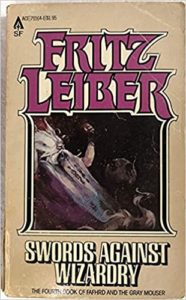Further into the adventures of Fafhrd and the Gray Mouser, Fritz Leiber tends toward longer stories. Swords Against Wizardry is mainly two tales, “Stardock” and “The Lords of Quarmall.” The other two in the volume, “In the Witch’s Tent” and “The Two Best Thieves in Lankhmar” are little more than stage directions setting up the longer works, although the latter shows how Fafhrd and the Mouser manage to lose some hard-won loot — something Leiber usually only alludes to — and how they might try to claim the title’s title for themselves, but how wrong they would be.
In “Stardock” the pair are following enigmatic hints of priceless treasure to be found at the top of the highest mountain in the range bordering Fafhrd’s native Cold Wastes. The peak gets its name from legends that the gods launched the stars from its top, and that some celestial bodies might still stop and dock there. There are some monsters on the way up, and some human opponents who seem to be racing Fafhrd and the Mouser to the same goal, but most of the story is concerned with two men battling the mountain.
Leiber brings to life the terror of the early days of alpinism, when climbers with very little gear pitted themselves against seemingly impossible heights. His heroes try to keep up their usual light-hearted banter in the face of deadly danger, but after a while even their irrepressible spirits give way to intense concentration. Leiber captures how easily small mistakes can multiply into deadly peril, or how climbers can do everything right and still find themselves in a terrible fix. And that’s without apparently invisible beasts having a run at them, or rival climbers who would just as soon see Leiber’s heroes dead. Then an unexpected door or two open, and the fantastic element comes into its own.
“Stardock” takes the physical adventure of “The Seven Black Priests” from Swords Against Death, improves on its tension and adds some classic Leiber strange sorcery.
“The Lords of Quarmall” is unusual in that it’s partly a collaboration with Harry Otto Fischer, a great friend of Leiber’s and in some ways co-creator of Fafhrd and the Mouser. Fischer wrote about 10,000 words of “Quarmall,” and Leiber dedicates Swords Against Wizardry to him. At the end of “The Two Best Thieves in Lankhmar,” Fafhrd and the Mouser have parted ways unhappily. In “The Lords of Quarmall,” each has hired on unbeknownst to the other with a rival son of the ruler of the peculiar sorcerous realm of Quarmall. That place occupies far less land than it once did, but for that its rulers have delved ever further into the earth, such that the underground places that they control are much larger than their space on the surface of the world. The supreme lord of Quarmall has two sons who are locked in a battle to succeed their father, whom they love, fear and loathe in nearly equal measure. He is not yet ready to yield his place, and dreams of a time when he might be succeeded by a far younger son, as yet unborn but quickening in the womb of his favorite concubine.
The two sons hire Fafhrd and the Mouser to be their physical champions, in the event that their sorcerous works are not enough to topple their rival and give them uncontested rulership of Quarmall. The setup of Quarmall doesn’t stand up to the slightest bit of scrutiny — there are said to be countless slaves, but there is no economy worth speaking up to support the lords’ material goods, let alone the pharaonic displays of power that appear later in the story — but this is not the kind of story that seeks to make a working system out of a fantasy world. This is a tale of rivalry, and it is all atmosphere and contained fury, plus a conundrum for Leiber’s heroes because it is inevitable that the two will discover the identity of the rival lord’s champion. How will Fafhrd and the Mouser get out of harming each other? Because a job is one thing, but friendship is quite another.
In both of the main stories in Swords Against Wizardry, women are held hostage by greater powers, and when given the opportunity they throw themselves at Fafhrd and the Mouser. It’s not that Leiber can’t write about capable women — indeed, the pair fall victim to women cleverer than themselves in “The Two Best Thieves in Lankhmar” — but in these stories he doesn’t.
With that caveat, these are classic sword and sorcery stories, just the thing for slipping into another world and enjoying some narrow escapes.

